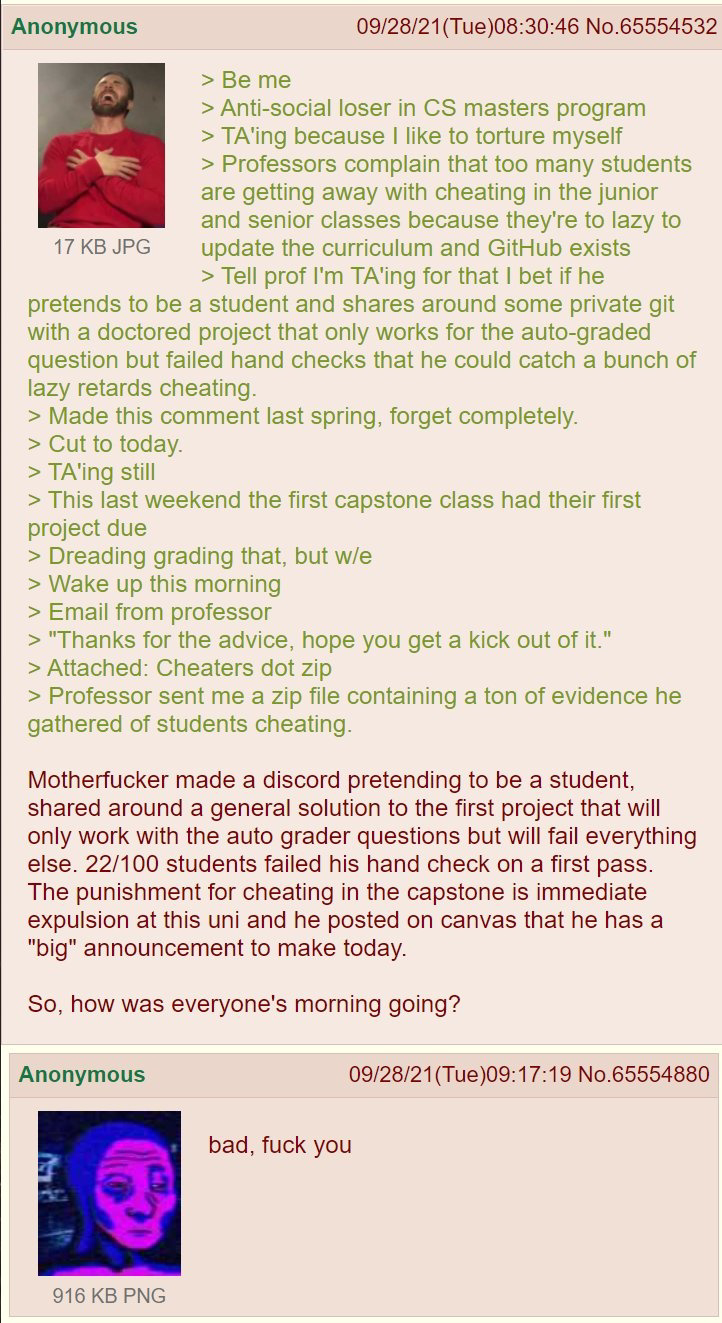this post was submitted on 06 Feb 2024
1110 points (98.1% liked)
Greentext
4430 readers
916 users here now
This is a place to share greentexts and witness the confounding life of Anon. If you're new to the Greentext community, think of it as a sort of zoo with Anon as the main attraction.
Be warned:
- Anon is often crazy.
- Anon is often depressed.
- Anon frequently shares thoughts that are immature, offensive, or incomprehensible.
If you find yourself getting angry (or god forbid, agreeing) with something Anon has said, you might be doing it wrong.
founded 1 year ago
MODERATORS
you are viewing a single comment's thread
view the rest of the comments
view the rest of the comments

I understand cheating is shitty but it would make a lot more sense for the teacher to make this a teachable moment about cheating, and to promote collaborative solutions, but also checking work you get from others.
A huge part of development is copying code and reusing code from libraries. The important part is that you know how the code you copy works.
If you give cheaters too many chances, the other students will feel betrayed. And I guess rightly so.
It's not uncommon to get mails directly, or later in course evaluation, from students who complain about other students that didn't put in the work. I can only remember few cases where there were names involved. Typically it's some general complaint, but the frustration is obvious.
It sucks when you make an effort but witness other students cheating their way through the class. What are we supposed to tell them when the dishonest behaviour of other students doesn't cause any consequences?
You tell them that they have learned the important life lesson:
In most situations, results matter more than the means by which you got them.
The result of a CS degree is supposed to be someone who knows how to program. This prof got what he wanted.
The result of any degree is someone who can get a degree. Everything else is a potential bonus, not a guarantee at all.
In the real world the faculty would step in to prevent losing so many students at once (tuition is lucrative), and the students would learn a couple life lessons: cheat but don't get caught, and if you do then might makes right.
Getting a degree without cheating is an impressive feat and teaches valuable skills. Unfortunately the underperforming cheating frat bro at the back of the auditorium will use his connections to land a C-level job making about 10x as much as his former classmates.
They don't give the money back when you're expelled. They made their dime off the idiots.
The school still loses on enrollment next year (or next semester or however it works contractually).
I'm not all up-to-date on academic fuckery but I seem to remember that universities tend to do a lot of fucky shit to keep attendance rates up as it matters for a lot of metrics. Losing a quarter of a class at once is probably not something that looks good on anyone's KPIs (and god knows the real world only cares about useless KPIs).
These schools are in such high demand that there's no extended vacancies.
This is true, and I feel like the people who complain about cheating are complaining about it because they feel like "the grade hasn't been earned", or what have you. Realistically, the problem here is that the students are robbing themselves of the opportunity to learn, ideally, rather than that they've stolen accolades from more promising students. The solution to that problem is a different approach that will get them to learn better.
Of course, college being what it is, you're probably not learning as much as you otherwise would, based on this structure which is oriented to be more of a zero-sum whittling down, so you can have a more limited group that you can then offer certifications to. The students aren't incentivized to learn (which, you know, should they be, or should they just want to learn because learning is cool? who knows.), and their knowledge, beyond a basic level, isn't even really necessary in the workforce. The dynamic is probably going to remain the same after graduation, where the high-income cheater frat bro gets a high paying job, and the put upon dork who thought hard work would get them somewhere eventually has to basically cover everything for them, or risk getting punted to the curb. STEM guys suffer this delusion that they inhabit a uniquely meritocratic position in the workforce, in the economy, but this is not true. Everywhere is littered with its people who succeed on merit, and succeed on raw unadulterated bullshit, it's the same everywhere.
You cannot correct these flaws by doubling down on perceived meritocracy and "objective" standards. The bias, the positive group and the negative group, are an intrinsic part of these systems. So to say, it's a feature, not a bug.
I actually see it as a good opportunity to teach them that means matter. By kicking cheaters out of the course.
My brother in Christ, can I get a hells yeah